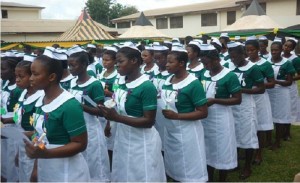About 308 health workers in the Northern Region have been trained on maternal mental healthcare, to enable them to screen and treat maternal mental mood disorders.
They included midwives, community health nurses and community psychiatric nurses drawn from 182 health facilities across the 26 Metropolitan, Municipal and District Assemblies (MMDAs) of the region.
The two-day training, held simultaneously in four zones of the region including Yendi, Damongo and Walewale, was facilitated by Dr Mohammed Soori, Senior Lecturer and Consultant Psychiatrist at Tamale Teaching Hospital and supported by a retired Deputy Director of Health Services, Madam Juliet Attinga.
It formed part of a four- year project dubbed: “Enhancing maternal mental health of pregnant women and mothers and their children to realize maternal and child health in Ghana.”
It is being implemented by Gub- Katimali Society (GKS), a Tamale-based non-governmental organisation, in collaboration with Basic Needs Ghana with financial support from Department for International Development, The Big Lotteries Fund, GRAND CHALLENGE CANADA, the jersey Overseas Aid Commission and Comic Relief.
The project seeks to contribute to improving maternal health and livelihood outcomes amongst poor and vulnerable women and girls.
More than 29,520 pregnant women and mothers and 3,260 pregnant adolescent and young mothers including an estimated 14,760 children would benefit from the project.
Sheikh Yakubu Abdul-Kareem, Programme Coordinator of GKS, who addressed the closing of the training in Yendi, urged the participants to put into practice the new skills they have acquired by giving the needed support to pregnant mentally ill/epileptic women to improve on maternal healthcare.
He encouraged the participants not to limit themselves to their facilities but to make follow up to homes to visit their clients.
He asked care-givers, parents and community members to send their pregnant mentally-ill/epileptic women, and young mothers to health facilities during delivery for their safety.
Meanwhile, GKS has held a meeting for leaders of community-based self-help groups and frontline staff of the MMDAs, to assess their support for mentally-ill and epileptic parents especially in the disbursement of the two per cent of the District Assemblies Common Fund allocations meant for persons with disability.
Health News of Tuesday, 5 July 2016
Source: GNA

















